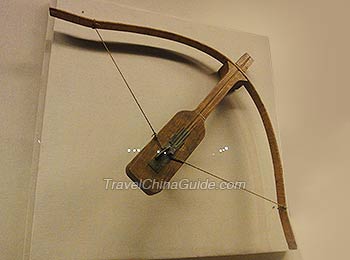Qin Crossbow - King of Cold Weapons
Also known as Qin Nu, the Qin crossbow is a long distance attack weapon that has a similar shape to the ordinary bow. An obvious difference between them is that the crossbow has an arm equipped with a trigger while the ordinary bow does not. Compared to the ordinary bow, people think more highly of the crossbow because it shoots farther, can be aimed more accurately and is more deadly.
|
|
Qin Crossbows Unearthed from the Terracotta Warriors Pits
Hundreds of Qin crossbow relics were unearthed from the Terracotta Warrior pits. In fact, more than 130 pieces were found at the eastern end of Pit 1. The crossbow, also known as Nu, is made up of three segments: the bow, arm and trigger. Covered and coated by straps and brown paint, the wooden bows of the excavated crossbows have rotten away. The wooden arms have rotted away as well. The 16.5-centimeter (6.5-inch) long bronze trigger is installed in the end of the arm, and it is composed of a sighting device, bush-hook and spigot.
The most complete Qin Nu was discovered during third excavation of Pit 1, and its bowstring, backside and bronze trigger are fully intact. The length of the bowstring is about 130 centimeters (51 inches). Some archaeologists guess the bowstring material is from the tendon of an animal due to its smooth surface.
Qin Nu can be divided into three types by the way the arrow is loaded: one type needs to be loaded with the hands and feet; one type with the waist, feet and hands; and one kind with the hands and arms. According to the historical records, there is also a kind crossbow linked in a row, which can shoot several arrows at one time.
The most complete Qin Nu was discovered during third excavation of Pit 1, and its bowstring, backside and bronze trigger are fully intact. The length of the bowstring is about 130 centimeters (51 inches). Some archaeologists guess the bowstring material is from the tendon of an animal due to its smooth surface.
Qin Nu can be divided into three types by the way the arrow is loaded: one type needs to be loaded with the hands and feet; one type with the waist, feet and hands; and one kind with the hands and arms. According to the historical records, there is also a kind crossbow linked in a row, which can shoot several arrows at one time.
Why Qin Nu Is Called the “King of Cold Weapons”?
1. Longer Shooting Range: It is estimated that the strong Qin crossbow had a shooting range of about 800 meters (0.5 miles), which is double that of a modern Soviet-made AK47 rifle. The common bows could shoot enemies only within about 100 meters (0.06 miles).
2. Greater Accuracy: Equipped with a trigger, the Qin Nu could aim and shoot enemies more accurately, and the moment of shooting can be more easily controlled.
3. More Deadly: The longer shooting range and faster speed enabled the Nu to pierce even armor and kill more enemies.
Advanced Techniques of the Qin Crossbow Array
1. In order to protect the soldiers from getting injured accidentally, bamboo chips were devised to surround the sharp and pointed bush-hook of the trigger.
2. Grooves are located on both sides of the wooden Nu arms, which allowed the crossbowmen to hold the bow in a steady way with arms and fingers. Also, some experts found that the arm of Qin Nu was lengthened to enhance its mighty impact and effective attacking range.
3. All parts of the Qin Nu were made to standard sizes, which allowed the exchange of components and easier mending of damaged crossbows.
4. Qin crossbow troops followed strict shooting procedures during battle. Once they shotted on enemy troops from all directions, the continuous attacking continued until the last opponent fell.
5. The army employed a guard team to protect the crossbowmen during battle.
6. Crossbowmen wore high-quality armor to reduce injury when fighting enemy troops.
Can the Crossbows Installed in Qin Shi Huang Mausoleum Work after about 2,200 Years?
You May Like
- Last updated on Feb. 18, 2024 by Gabby Li -

